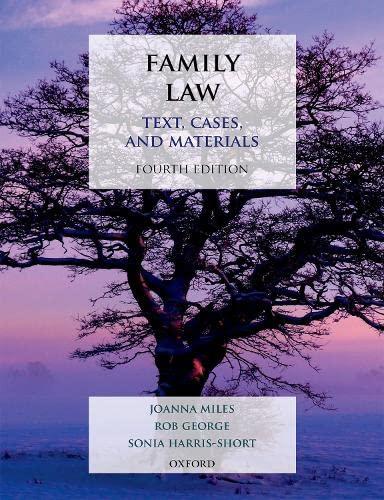Answered step by step
Verified Expert Solution
Question
1 Approved Answer
Read the caseDesgro v. Pack https://scholar.google.com/scholar_case?case=17486190638930430176&q Carefully explain the following words and statements from the case: 1. The trial court granted summary judgment to defendant,
Read the caseDesgro v. Pack https://scholar.google.com/scholar_case?case=17486190638930430176&q
Carefully explainthe following words and statements from the case:
- 1. The trial court granted summary judgment to defendant, finding that the contractual limitation period was reasonable and enforceable. The trial court stated that plaintiff "had plenty of time to find any deficiency" because he had been living in the home for at least ten months when the contractual limitations period expired. (As part of this explanation, please define "summary judgment.")
- 2. A grant of summary judgment is not presumed correct by this court; rather, this court must "make a fresh determination" in each case that the requirements of Tenn. R. Civ. P. 56 have been satisfied. In doing so, this court must consider the evidence in the light most favorable to the non-movant and draw all reasonable inferences in his favor.
- 3. The interpretation and construction of a plain and unambiguous written contract is a question of law for determination by the court. It is the duty of the court to enforce the contract according to its plain terms, and the language used in the contract must be taken and understood in its plain, ordinary and popular sense. However, "the cardinal rule for interpretation of contracts is to ascertain the intention of the parties and to give effect to that intention as best can be done consistent with legal principles." Courts may determine the intention of the parties "by a fair construction of the terms and provisions of the contract, by the subject matter to which it has reference, by the circumstances of the particular transaction giving rise to the question, and by the construction placed on the agreement by the parties in carrying out its terms." (Do not repeat the quotes, use your own words to explain.)
- 4. In this case, the agreement at issue is not an adhesion contract because it was not shown that plaintiff had to "take it or leave it" or that he was forced to acquiesce to the terms of the agreement to get the service he desired. Plaintiff did not question the terms of the agreement, did not attempt to bargain with the defendant regarding the agreement, and there was no proof that defendant told plaintiff he had to sign the document to obtain the service. Plaintiff stated that he contacted defendant at the recommendation of his realtor, but plaintiff likely could have obtained the service from someone else because plaintiff did not show that defendant was the only home inspector in the area. Accordingly, we do not need to examine the contract's provisions to determine their reasonableness because the agreement at issue is not a contract of adhesion.
- 5. In this case, the language plaintiff complains of is not an unenforceable exculpatory clause. The language is a contractual limitations period, which our court has repeatedly held to be enforceable so long as the period is reasonable. The provision does not exculpate defendant from most or all liability, but rather limits the time period within which plaintiff can file suit against defendant. Thus, plaintiff's argument in this regard is without merit.
- Explain who won the case and why
Step by Step Solution
There are 3 Steps involved in it
Step: 1

Get Instant Access to Expert-Tailored Solutions
See step-by-step solutions with expert insights and AI powered tools for academic success
Step: 2

Step: 3

Ace Your Homework with AI
Get the answers you need in no time with our AI-driven, step-by-step assistance
Get Started


